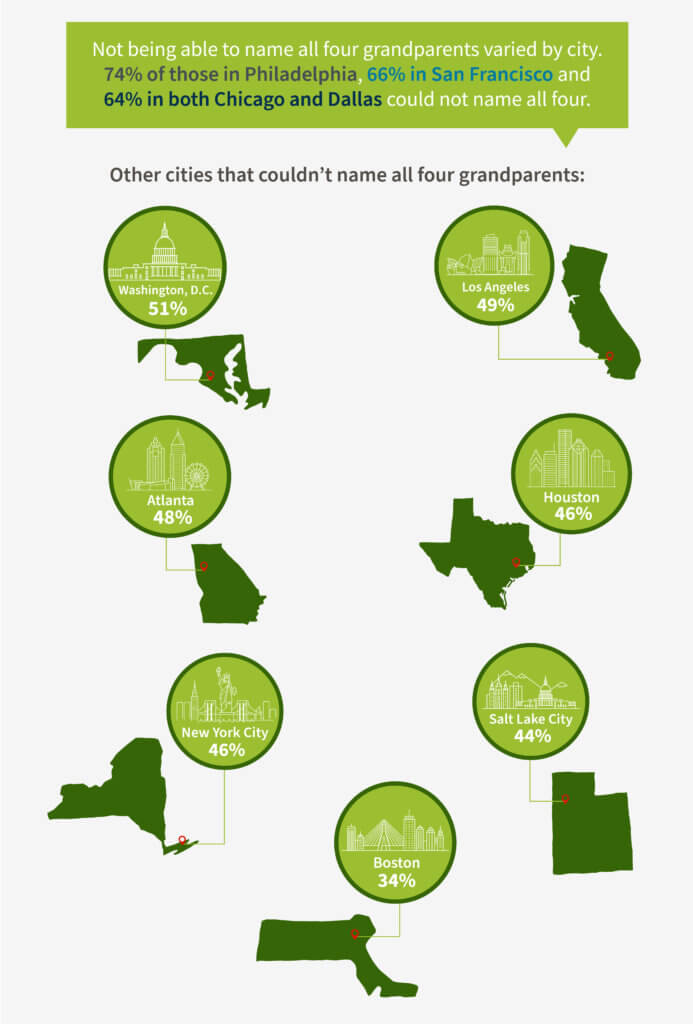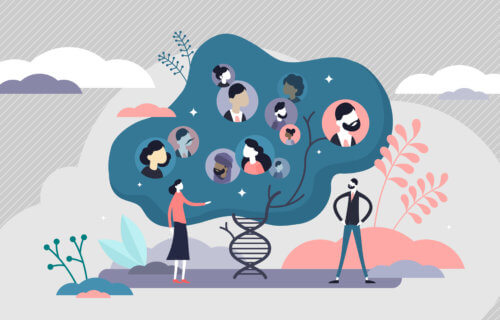
NEW YORK — Familiar with your family tree? There’s a good chance you’re not. More than half of Americans don’t know the names of all four of their grandparents.
A recent survey of 2,113 U.S. adults, including 1,911 from the top 10 Nielsen market areas and 202 from Salt Lake City, found that there is a massive knowledge gap when it comes to recent family history. Knowledge of past generations varied by city, as 66 percent of Boston residents could name all of their grandparents, compared to only 26 percent of those in Philadelphia. San Francisco residents weren’t much better at 34 percent, while people in Chicago and Dallas only slightly higher at 36 percent.
As a whole, just 47 percent of respondents could correctly name all four grandparents.
The apple falls a bit far from the family tree
Conducted by OnePoll on behalf of Ancestry, the survey also reveals that only four percent could name all eight of their great-grandparents. When it comes to knowing the most about their family history, three in four people in Salt Lake City say they feel knowledgeable compared to 46 percent of those in Philadelphia.
Despite the knowledge gap, most respondents expressed interest in learning more about their family history (66%). In particular, over half the poll (51%) want to know stories about when their ancestors were young and what their were like at the time.
Most people claim to know the bulk of their family history from parents (43%) or grandparents (40%) relaying stories.
“Listening to family stories is a great starting point to learn about your family’s past, but some details can get lost as they are passed down for generations,” says Crista Cowan, Corporate Genealogist at Ancestry, in a statement. “Digging deeper into records, such as census records, can help fill in the gaps and add rich historical context about more recent family history.”

Catching up with the Census
On April 1, the 1950 U.S. Census was made public. Ancestry is indexing the records state by state to make them searchable for everyone for free. The 151 million newly released records will provide key details about more recent generations.
With the release of the 1950 U.S. Census records, respondents are most interested to learn their ancestors’ employment details, including salary, status and hours worked (38%) and occupations (35%), followed by names (34%) and ages (34%).
“It’s exciting that younger generations now have the opportunity to learn more about family members they know, like parents and grandparents,” Cowan says. “The 1950 Census provides a fascinating look at an era in our collective history, marking the first time baby boomers appear in a U.S. census. The real magic happens when you discover a more complete picture of not only what your family member’s life was like at a moment in time, but also how it had changed over the decades.”

Ancestry doing it for free? sure. you have to have an account…
let the profiling and correlating begin (er, continue)
As a southerner, I find this hard to believe. From birth I know the names of my Revolutionary ancestors as well as those of my grand parents
This isn’t shocking. I’m among the rare Americans who travel abroad, and extensively. An empirical observation, Americans place less demonstrative value on family than many other societies. Examples, the dearth of paid (or even unpaid) workplace maternity/paternity leave, the gross inequality in work-life balance, and the refusal to pay livable wages, forcing a disproportion of American workers to have multiple jobs. All of these factors contribute towards an absence in their children’s developmental stages and perpetuate delinquency. The US has among the lowest population of middle-class and the highest number of poor employees in the West. Unsurprisingly, it also has the highest crime rates, particularly gun violence, and youth criminality. Employing “family values” as a political mantra and actively creating a system fostering it are dissimilar.
I’ve traveled the globe and interacted with numerous cultures in which it’s the norm that people can recite their family lineages stretching back for centuries. Then again, those societies possess a strong sense of family values. It’s from them that motivated me to learn my own family heritage and teach my children.
That is such a good thing! I know my grandparents, great-grandparents and most of my great great grandparents and some further on back! And I’m working on finding more! Family is so important! When I’m outside, when I’m riding a bus, or at functions it’s so clear to see people ignore their own family too much!